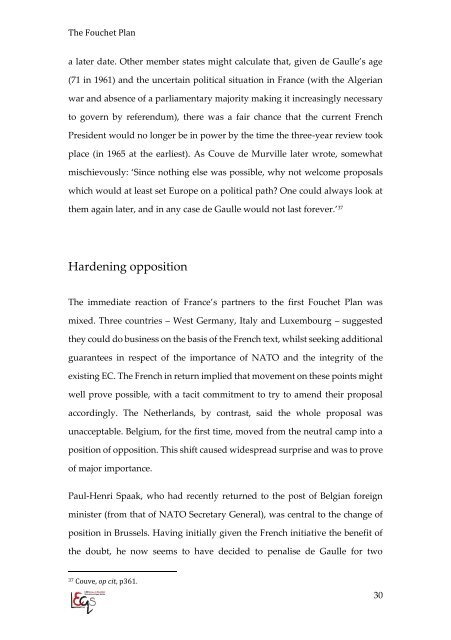The Fouchet Plan De Gaulle’s Intergovernmental Design for Europe
n?u=RePEc:eiq:eileqs:117&r=cdm
n?u=RePEc:eiq:eileqs:117&r=cdm
Create successful ePaper yourself
Turn your PDF publications into a flip-book with our unique Google optimized e-Paper software.
<strong>The</strong> <strong>Fouchet</strong> <strong>Plan</strong><br />
a later date. Other member states might calculate that, given de <strong>Gaulle’s</strong> age<br />
(71 in 1961) and the uncertain political situation in France (with the Algerian<br />
war and absence of a parliamentary majority making it increasingly necessary<br />
to govern by referendum), there was a fair chance that the current French<br />
President would no longer be in power by the time the three-year review took<br />
place (in 1965 at the earliest). As Couve de Murville later wrote, somewhat<br />
mischievously: ‘Since nothing else was possible, why not welcome proposals<br />
which would at least set <strong>Europe</strong> on a political path? One could always look at<br />
them again later, and in any case de Gaulle would not last <strong>for</strong>ever.’ 37<br />
Hardening opposition<br />
<strong>The</strong> immediate reaction of France’s partners to the first <strong>Fouchet</strong> <strong>Plan</strong> was<br />
mixed. Three countries – West Germany, Italy and Luxembourg – suggested<br />
they could do business on the basis of the French text, whilst seeking additional<br />
guarantees in respect of the importance of NATO and the integrity of the<br />
existing EC. <strong>The</strong> French in return implied that movement on these points might<br />
well prove possible, with a tacit commitment to try to amend their proposal<br />
accordingly. <strong>The</strong> Netherlands, by contrast, said the whole proposal was<br />
unacceptable. Belgium, <strong>for</strong> the first time, moved from the neutral camp into a<br />
position of opposition. This shift caused widespread surprise and was to prove<br />
of major importance.<br />
Paul-Henri Spaak, who had recently returned to the post of Belgian <strong>for</strong>eign<br />
minister (from that of NATO Secretary General), was central to the change of<br />
position in Brussels. Having initially given the French initiative the benefit of<br />
the doubt, he now seems to have decided to penalise de Gaulle <strong>for</strong> two<br />
37 Couve, op cit, p361.<br />
30


